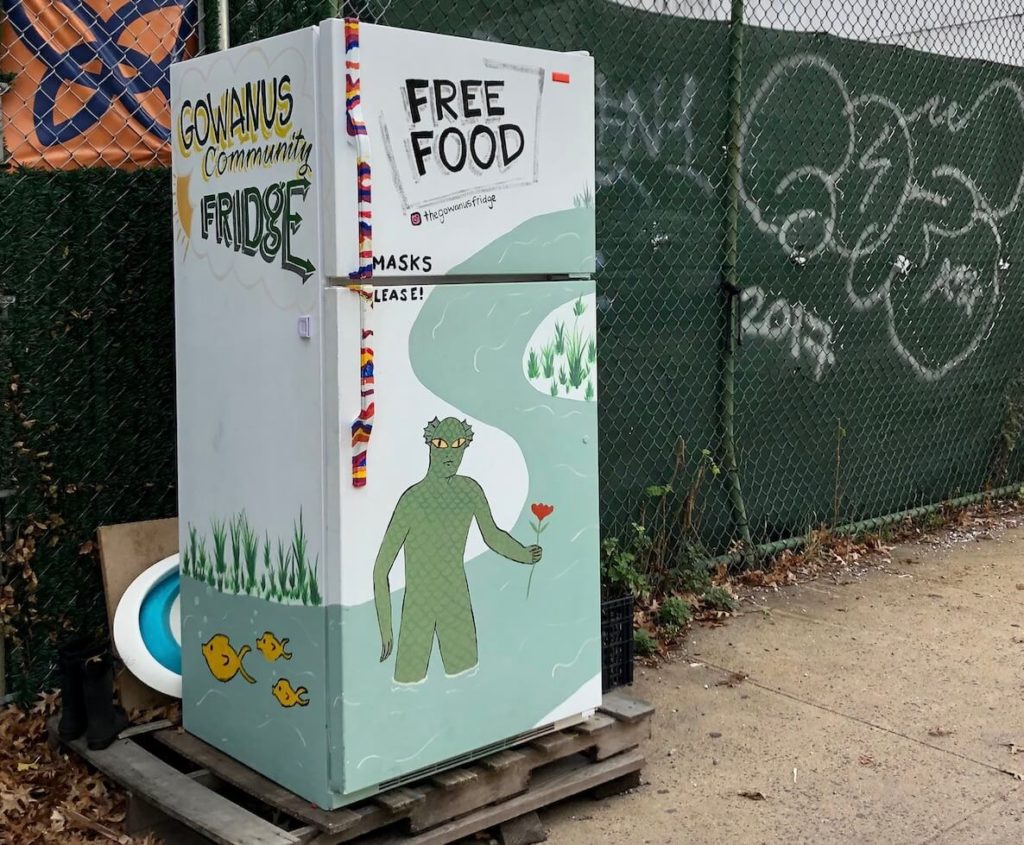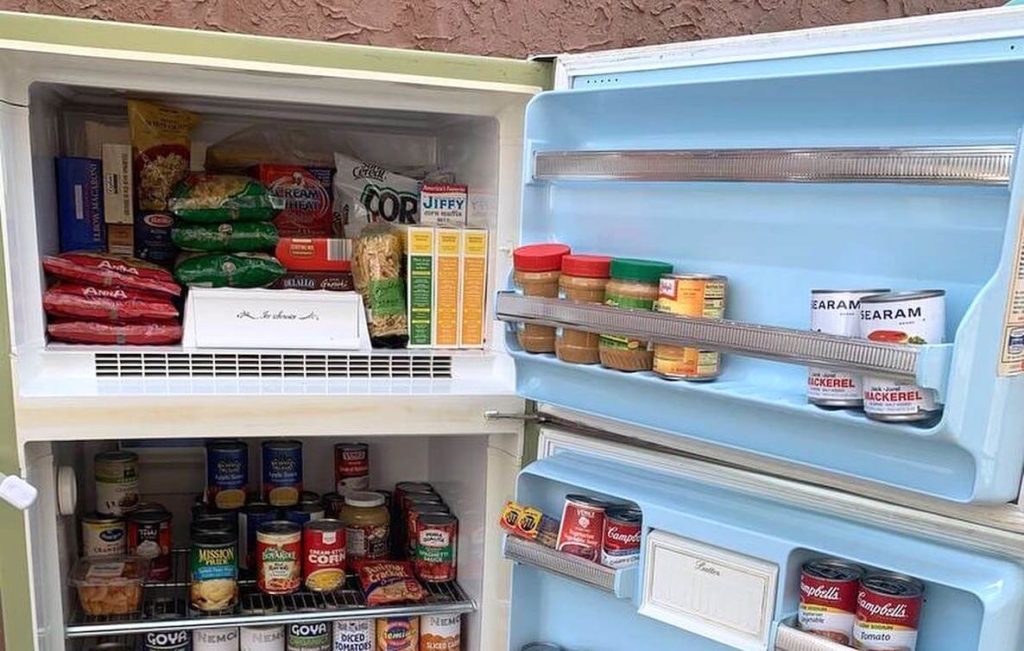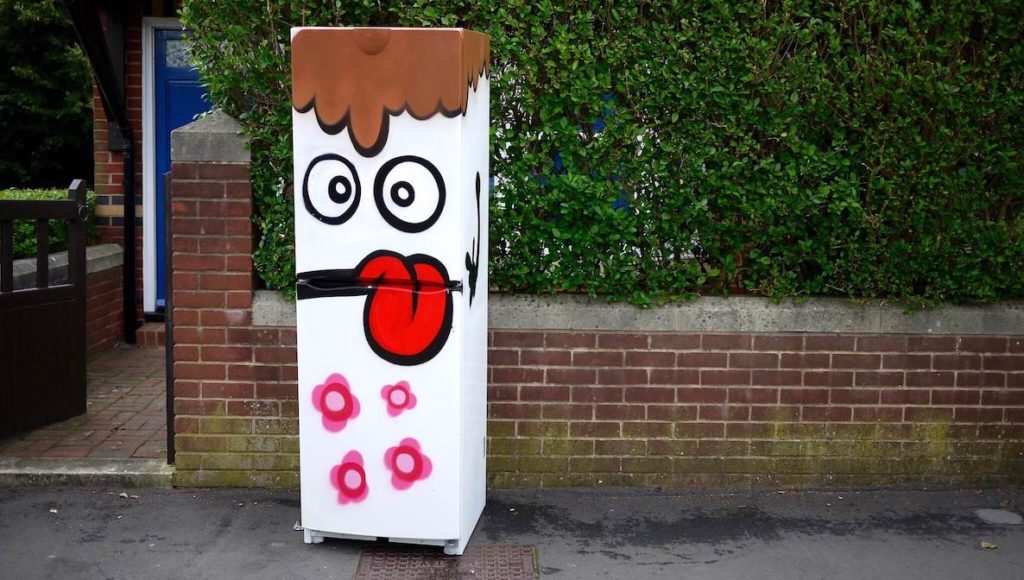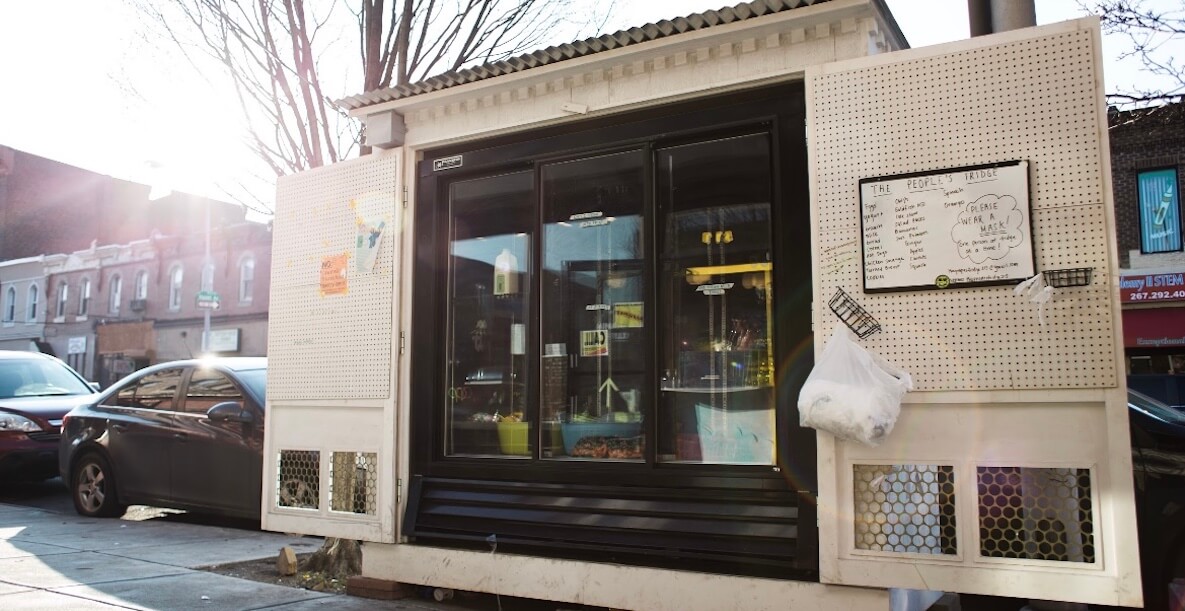Sisters Sonia and Sonam Parikh opened The People’s Fridge on 52nd Street to honor their father, who passed away last year. When he died, the sisters received dozens of calls about how their late father had donated and bought food for those in need. After months of hard work and planning, their community fridge opened in front of the West Philly coffee shop Mina’s World in September 2021.

Since the start of the pandemic, more than a dozen community fridges in Philly have opened to help alleviate the deepening and long-existing systems of racism and oppression that contribute to food insecurity in the city. Sometimes known as “freedges,” community fridges are a type of mutual aid project that offer fresh fruit and vegetables, prepared meals and non-perishable items that are free for all and can be accessed through an outdoor refrigerator at any time.
Around the time when the Parikh sisters were planning their fridge, Jane Ellis of Mount Airy was scrolling through Instagram when she saw a community fridge in New York City. Ellis, a fourth grade teacher at Greene Street Friends School in neighboring Germantown, thought it would be a good idea to open a fridge in the area where she worked. Her school agreed to host the fridge, installing an outdoor electric outlet and paying the yearly electric costs.
So where do you begin if you want to start a community fridge of your own? We asked Sonia Parikh and Ellis for advice.
![]()
5 TIPS FOR STARTING A COMMUNITY FRIDGE
1. Talk with the community and establish relationships

A neighborhood may have a strong need for a community fridge, Parikh explains, but it can easily become a burden if local input is ignored. When she and her sister started talking to West Philly residents about what they would want in a fridge, they promised not to open one where the fridge could take customers away from a small business. Since many in the area are Muslim, they also decided to not allow raw meat and pork in the fridge.
Talking with the local community is also good networking for finding people who want to contribute to the fridge. When Ellis began speaking with Germantown residents about the idea of a community fridge in their neighborhood, she found volunteers who were willing to contribute their time and money into building an attached pantry.
Most neighborhoods in Philly have active civic groups and many blocks have a block captain. Speaking with these groups and people is a good first step in figuring out what the needs of the community are, and whether or not a community fridge might be beneficial to the area.
2. Find a host for your free food fridge
“If you don’t have a host, you don’t have a fridge,” says Parikh. It’s a sentiment that Ellis reiterates.
What constitutes a good host depends on the type of relationship you’re seeking, but at the very minimum you should look for a host who’s excited about alleviating food insecurity. Some hosts will also pay for the electric cost and others will help with stocking the fridge. For the sake of transparency, it’s helpful to have a signed agreement that details who is liable for cost and upkeep.
You should also reach out to local small businesses, community centers and houses of worship to see if they’d be willing to host a community fridge on their property. While there are no laws that prevent community fridges from being hosted in residential areas, be wary of how neighbors would feel.
3. Figure out what materials you’ll need in your community fridge

There are two things every successful community fridge needs: a fridge, and a steady supply of food.
 When speaking with members of the community, see if there is anyone willing to donate a fridge or their time. Local bakeries and restaurants are sometimes willing to donate leftover meals and goods. If neither of these are possible, consider setting up a community fund where people can donate and help pay for the cost of the fridge and groceries or apply for a micro-grant.
When speaking with members of the community, see if there is anyone willing to donate a fridge or their time. Local bakeries and restaurants are sometimes willing to donate leftover meals and goods. If neither of these are possible, consider setting up a community fund where people can donate and help pay for the cost of the fridge and groceries or apply for a micro-grant.
Regardless of how you get food for your fridge, it is important to have a set of guidelines to follow for what is allowed in the fridge to prevent messes, protect those with allergies and to be considerate to those keeping kosher or halal.
Prepared meals should be covered and have an attached list of ingredients. A list of acceptable donations should be listed on the community fridge and wherever it’s advertised.
RELATED: Do good by ordering takeout from these 11 generous local spots that give back to their communities
4. Make a community fridge maintenance plan
The upkeep of a community fridge is the hardest part of running one.
As an organizer, you must make sure the fridge is weatherized and pest-proof. If a fridge is outside, it should have some type of covering and be connected to a weatherproof outlet. All non-perishables that are not stored within the fridge must be in closed cabinets.
Community fridges need to be checked up on at least twice a day, if not more, to be cleaned, organized, stocked and purged. The best way to do this is to make a list of regular volunteers and assign them times to either check in on the fridge or go food shopping. It’s best to have at least one additional volunteer on call, in case whoever was originally scheduled has to skip out on their fridge duties.
5. Open the food fridge for the right reasons

There are plenty of reasons why people want to start a community fridge. Maybe you’re passionate about food justice, maybe you grew up without access to healthy foods. Whatever your reason, make sure it’s a commitment you’re willing to keep. Community fridges require hours and hours of hard, unpaid work.
While many aspects of a fridge can vary between different neighborhoods, their leaders have one thing in common: a fiery passion for mutual aid and helping those around them. If you have that passion, you’re ready to start a community fridge.
The Citizen is one of 20 news organizations producing Broke in Philly, a collaborative reporting project on solutions to poverty and the city’s push towards economic justice. Follow the project on Twitter @BrokeInPhilly.
![]()
RELATED




